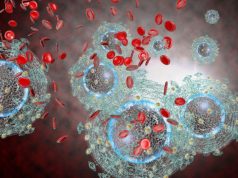Balversa indicated for treatment of bladder cancer with FGFR3 or FGFR2 genetic alteration
FRIDAY, April 12, 2019 (HealthDay News) — The first personalized treatment for patients with metastatic bladder cancer and susceptible fibroblast growth factor receptor (FGFR) genetic alterations was granted accelerated approval by the U.S. Food and Drug Administration, the agency announced.
Balversa is indicated for adult patients with locally advanced or metastatic bladder cancer with the FGFR3 or FGFR2 genetic alteration that has progressed with previous platinum-containing chemotherapy. The FDA says patients should be selected for Balversa therapy using an FDA-approved companion diagnostic device, the therascreen FGFR RGQ RT-PCR Kit.
Approval was based on data from a clinical trial of 87 patients with locally advanced or metastatic bladder cancer with the FGFR3 or FGFR2 genetic alteration that progressed after chemotherapy. The researchers found an overall response rate of 32.2 percent; 2.3 percent of patients had a complete response, and nearly 30 percent had a partial response to treatment. Treatment response was maintained for about 5.5 months. The researchers also observed responses to Balversa in patients who had not previously responded to anti-PD-L1/PD-1 therapy.
Patients commonly reported side effects of increased phosphate level, mouth sores, tiredness, change in liver and kidney function, diarrhea, dry mouth, nails separating from the nail bed or poor formation of the nail, low sodium levels, decreased appetite, change in taste, anemia, dry skin and eyes, and hair loss. They also reported hand foot syndrome, constipation, stomach pain, nausea, and muscle pain. The FDA cautions that Balversa may cause inflamed eyes, inflamed cornea, and disorders of the retina. Patients should have intermittent eye examinations and contact a health care professional at the first signs of blurred vision, vision loss, or other visual changes. Health care professionals should monitor patients’ blood phosphate level at 14 to 21 days after the start of treatment and monthly. They should increase dosage in patients who have serum phosphate levels below the target level.
Balversa could harm a developing fetus or newborn baby, so effective contraception is recommended during treatment and for one month after the last dose. Women of reproductive potential should also receive pregnancy testing before starting treatment with Balversa; those who are pregnant or breastfeeding should not be treated with Balversa. The drug must be administered with a patient medication guide.
Approval of Balversa was granted to Janssen Pharmaceutical.
FDA release
Copyright © 2019 HealthDay. All rights reserved.








